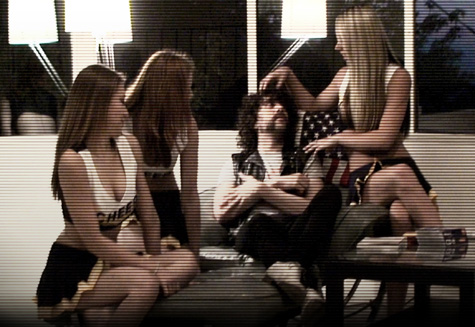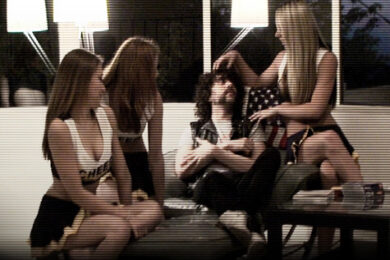A time-buyer before they start work on their second album perhaps, but November 10 sees the release of a Justice DVD documentary, directed by their friends Romain Gavras and So Me, and accompanying live CD. Touring: it’s pretty much all they’ve done since the release of their debut album in 2007 (they play London again on October 25), and in this film you catch them on a three-week jaunt round the States.
Justice, thrust into the limelight as a consequence of the surprise success of their 2003 edit of Simian’s ‘Never Be Alone’, used to be a red herring of a live act. They famously didn’t know how to DJ when they were first offered club gigs and they claim they learnt how to make music by taking on remix work for such entry-level artists as Franz Ferdinand and Britney. It’s a good story.
Since then they’ve become a tuned, powerhouse of a performing duo and a globally recognised musical brand. Image is crucial to them, and they seem to court controversy for fun. The ultra-violent video for their ‘Stress’ single was an internet sensation that became a mainstream scandal in France and, more recently, they had a hoo-ha with London superclub Fabric who rejected a mix they’d cut for their CD series.
Here, the taller, elder, curly-haired member of the Parisian pair, Gaspard Augé, gives The Quietus a progress report on Justice in late 2008 after a bonkers couple of years. He’s an intriguing character – seemingly of a nervous disposition (he stutters badly – edited out – and smokes continually) and seemingly uninterested in being interviewed. It’s hard to tell from a written transcript but Gaspard appeared tired and bored during the early part of this conversation. But then, asked whether talking about Justice had become a chore, he was oddly startled.
French underground music went super-overground earlier this year when Sébastien Tellier represented France at the Eurovision Song Contest. Was that a big deal in your country?
Gaspard Augé: "It was really a big step in music history – maybe the biggest step – to go from the French underground to Eurovision, but it was definitely part of his sense of humour. He’s an entertainer and he likes making weird jokes between songs when he plays and he’s a really funny guy. It was fun to watch, especially the part after the show when he was interviewed and he was completely drunk."
What did the average French person think about it?
GA: "I think the average French person thought it was the shame of French music. I think they thought he was just a silly, bald, drunk guy and he shouldn’t be representing France."
How does France respond to their underground musicians – people like you and Tellier?
GA: "For us, in the very beginning, people were blinded by the hype thing. But in France now, the crowd has got much younger and they don’t care what is cool and what isn’t – they are just coming to the shows and having fun. It is very exciting for us to play shows to very varied crowds. I don’t know how but these days the front rows are made up of 14-year-old girls screaming. It’s kind of funny, but it’s hard to tell whether they really like the music or just the way we dress. We feel a kind responsibility because we are giving these people their first live experience."
Are you happy with your live show these days?
GA: "Because it’s been six or more months that we have been doing the live show like we are now, and we are constantly changing it one night to another, we are almost reaching… not perfection, but at least the idea we had of it at the beginning. It’s definitely more efficient and fluent than six months ago."
What’s the news on your second album?
GA: "We are beginning to have a few ideas, but we really need some time before we start properly. I guess we will start at the beginning of next year."
Are you getting tired of performing the same material?
GA: "No, because it is constantly evolving. It’s fun and it’s getting better and better when we play live."
Have you been surprised by your success?
GA: "Definitely. When we were about to release the album, we couldn’t imagine that we would get good reviews in the newspapers. It’s not good to have expectations and if the record isn’t good, everyone loves to trash you, especially in France. In the end we got very lucky, but I think it was that – luck, and timing."
Do you feel like you’ve reached something of a destination now?
GA: "Definitely not. It would be very sad to think that we had made it. It’s still the beginning of the adventure, or maybe it’s the end, I don’t know. Perhaps in six months we will be out of fashion. But we never thought about people’s expectations. If you’re making a record and it doesn’t work then you are not even proud of your own stuff."
So your ambitions haven’t changed?
GA: "No, because we never had any huge ambition or expectations. It’s going quite well, but we’ve been making music together for five years now – it’s not that long, but it doesn’t feel like instant success. I guess we feel like we took our time."
Are you pop stars and, if so, do you enjoy the attention?
GA: "We are definitely not pop stars – nobody recognises us. And we are definitely not frontmen – we hide behind this huge machine."
And you feel comfortable being hidden?
GA: "Yeah, sure."
How is the relationship between the two of you? Are you getting closer?
GA: "Yeah, but it’s really hard to step back from it. We have been spending 24/7 together for four years, but it’s still very fun. We have been living in the same flat with our graphic designer for five years now; it’s like a couple relationship and a brotherly relationship and a normal friendship at the same time."
Were you surprised by the reaction to your video for ‘Stress’?
GA: "No, we were expecting some fuss obviously, but definitely not on those topics, such as racism. We wanted to make something very far from our universe, just because the song was different from ‘D.A.N.C.E.’ and the other gentler, hippy tracks, you might say. We were looking for something violent because the song is violent."
So you were shocked when you were accused of making a racist video?
GA: "Yeah, because if people see racism in the video, it’s definitely because they might have a problem with racism; because they only see black people beating up white people, which is not what happens. The main thing we’ve learnt with this kind of experience is that the newspapers in France, even the most respected ones, are always hungry for juicy stuff. But if we were to do it again, we would do it exactly the same. It was kind of an experiment in making an un-broadcastable video for an un-broadcastable song, because we knew the song would never be played on the radio. It’s funny because some papers were saying we were banned from TV, but it was exactly the opposite: it was on the internet and then every music and TV channel called us to get the hi-res version to play on MTV and news programmes. We just said no."
You’ve said before that the visual side of Justice was 50 per cent of what you were all about. Do you still think that?
GA: "Yes, I really hope we are providing some interesting music and also a bit more than that; something exciting for people to look at. We think that is definitely the history of pop."
And you think of yourselves as pop musicians?
GA: "Yes, we are just trying to make a kind of modern disco – today’s disco."
What about all the stuff that comes with it – these days of interviews and the relentless promotion? Is it a chore? Have you lost your excitement in telling people about what you do?
GA: "No, no, no! It’s cool. It’s still fun and when the questions are interesting, like now. But it’s definitely a bit boring when people don’t know anything about you and are always asking about the Kayne West incident [MTV Awards 2006, when West invaded the stage claiming he should won the award that Justice did] and stuff. I guess it depends on the target audience."
Have people been asking you about this rumour that you were going to produce the new Red Hot Chili Peppers album?
GA: "Yeah, but it’s definitely only a rumour. It came out of some picture of Anthony Kiedis wearing a Justice t-shirt at some basketball game."
Still, it’s nice he was wearing your t-shirt.
GA: "Yeah, yeah!"
The Fabric mix CD: what’s the story there? They didn’t want to put it out?
GA: "Ah yeah, it’s quite complicated. They had this length policy – they wanted it to last 74 minutes, the maximum length of a CD. But we could only clear 24 tracks and it would have been really boring to make the songs longer to fill up the CD."
How long was it?
GA: "Forty-eight minutes, something like that. We definitely thought it would be fun to make a shorter edit and keep the best parts of the songs. And aside from this length problem, I guess they just didn’t enjoy the tracklisting because it was kind of an experiment to see if those very French tracks would work. In France, it is definitely considered cheesy music, but for us the songwriting is amazing and it would have been fun to see if people who come from a different background would enjoy the music."
Did Fabric think it was joke?
GA: "Maybe they thought it was a kind of joke."
I think a lot of people think you’re jokers. ‘D.A.N.C.E.’ came out – a tribute to Michael Jackson – and it had kids singing in it…
GA: "Of course we were thinking of the irony of having kids in a kind of Michael Jackson tribute. But we did the Fabric mix in a very sincere way – it was a kind of ’25 Best Of Ever’ for us."
People not knowing whether you are being serious or not must be fun – it gives you a kind of freedom, doesn’t it?
GA: "What’s cool about it is that people don’t really know what to expect from us. We are trying to surprise ourselves by going from one extreme to another – putting ‘D.A.N.C.E.’ out, then ‘Stress’, for example – and we hope we will continue to do so."
Justice: A right pair of tits? Watch the trailer to A Cross The Universe here. The DVD comes out on November 24 on Ed Banger.



